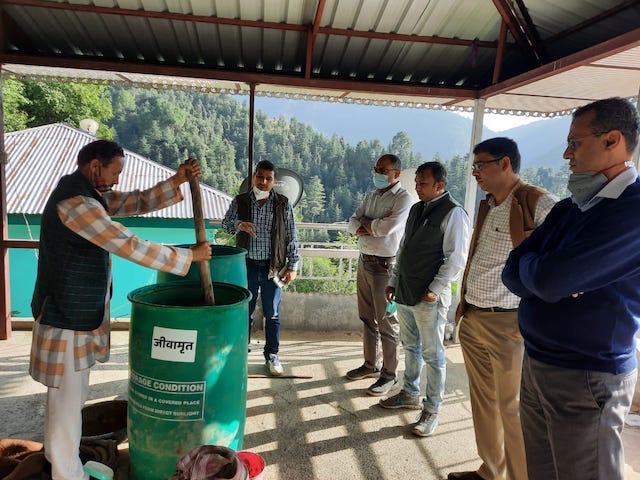Shimla: A collaboration between the State Project Implementing Unit (SPIU) of Prakritik Kheti Khushhal Kisan Yojana of Himachal Pradesh government and the Council of Scientific & Industrial Research (CSIR)- Institute of Microbial Technology (IMTech), Chandigarh is on the cards for microbial study of dung and urine of indigenous cows being used for Subhash Palekar Natural Farming (SPNF) in the hill state.
The SPNF is a non-chemical low-cost climate-resilient agriculture technique, being promoted under PK3Y in Himachal Pradesh since its launch in 2018. It recommends the use of dung and urine of indigenous cow breeds as the key components for fertility-enhancing and plant protection.
The government has given financial assistance for the purchase of 1000 indigenous cows by farmers under PK3Y across the state so far.

The cow dung harbours a rich microbial diversity, different species of bacteria, protozoa and yeast that play a significant role in the promotion of plant growth and plant protection. The utilization of cow dung bacteria can mobilize nutrients, besides contributing to sustainable agriculture.
The CSIR team of scientists headed by Director, Dr Sanjeev Khosla was in Shimla earlier this week to visit the farms, where SPNF technique is being followed by using different formulations like Beejamrit, Jeevamrit, Ghanjeevamrit etc prepared from urine and dung of indigenous cow, besan, jaggery and locally resourced leaves. The team visited an apple orchard of SPNF farmer, Hem Raj Sharma at Moolberi village in Totu block and then a vegetable grower Sonam, who is doing natural farming of vegetables in polyhouses at Koara village in Mashobra block in Shimla district.
They interacted with the farmers and PK3Y officials and understood the basic concept of natural farming, its formulations and methodology and impact on the cultivation, production AND economy of the farmers, along with the state government’s initiative to promote SPNF among the farmers.
Accompanied by Dr Ashwani Kumar and Dr Deepak Sharma from IMTech, Director, Dr Khosla also held a meeting with the State Project Director, PK3Y, Mr Rakesh Kanwar and Executive Director, PK3Y, Dr Rajeshwar Singh Chandel in Shimla to work out the modalities of the collaborative research.
Earlier this year, a team comprising Executive Director, PK3Y, Dr Rajeshwar Singh Chandel and Veterinary Officer with SPIU, PK3Y, Dr Sushil Sood had visited the IMTech, Chandigarh twice to formalize a collaborative study with IMTech.
“A Memorandum of Understanding (MoU) is being signed shortly between the SPIU, PK3Y, Himachal Pradesh government and the CSIR-IMTech shortly,” said Dr Sushil Sood, Veterinary Officer.
Dr Sood said that the collaborative research with IMTech proposes to isolate an array of bacteria from indigenous cow’s dung, followed by their identification and preliminary screening with reference to key fertility-enhancing components in SPNF practices.
“The work plan aims at extraction, amplification, cloning and sequencing of Microbial DNA from fresh cow dung, evaluating Microbial Diversity and Quantification in preparations such as Beejamrit, Jeevamrit and Ghaneevamrit so as to standardize the formulation of these mixtures for different agro-climatic zones. It also includes identification of the most beneficial and efficient microflora for increasing efficacy and efficiency of existing methods of these SPNF mixtures,” Dr Sood said.
He said the total community DNA can be extracted from fresh dung of indigenous cattle breeds (such as Sahiwal, Red Sindhi, Himachali Pahari Churu, etc.) being reared in different management conditions (free-range, semi-intensive and stall feeding systems) and agro-climatic zones of Himachal Pradesh. The collaborative study would help in studying the SPNF principles scientifically to standardize the farm inputs prepared from the dung and urine of indigenous cows for betterment in the field.
The SPIU, PK3Y has already tied up with state farm Universities in Palampur and Solan to study different aspects of natural farming.


